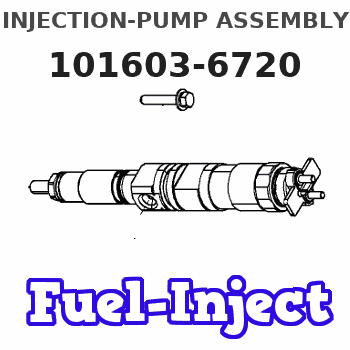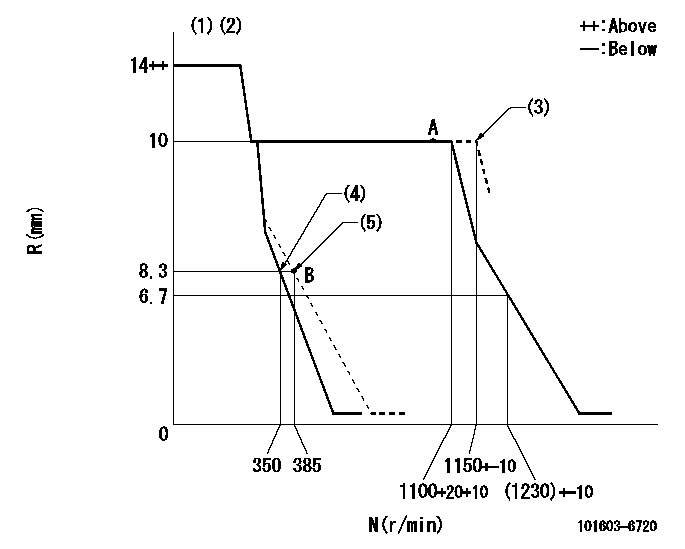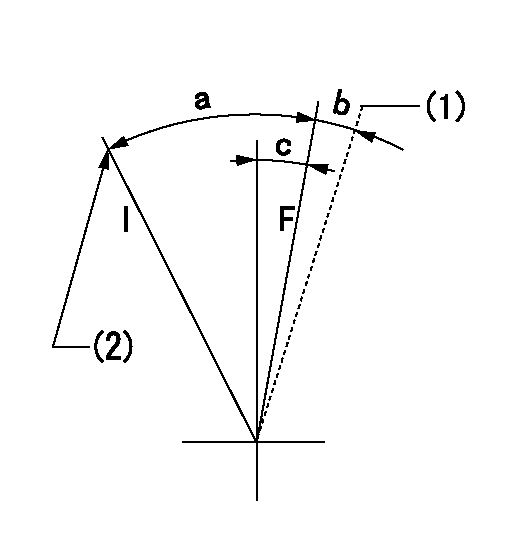Information injection-pump assembly
ZEXEL
101603-6720
1016036720
MITSUBISHI
ME070260
me070260

Rating:
Service parts 101603-6720 INJECTION-PUMP ASSEMBLY:
1.
_
6.
COUPLING PLATE
7.
COUPLING PLATE
8.
_
9.
_
11.
Nozzle and Holder
12.
Open Pre:MPa(Kqf/cm2)
21.6(220)
15.
NOZZLE SET
Include in #1:
101603-6720
as INJECTION-PUMP ASSEMBLY
Include in #2:
104749-6850
as _
Cross reference number
ZEXEL
101603-6720
1016036720
MITSUBISHI
ME070260
me070260
Zexel num
Bosch num
Firm num
Name
101603-6720
ME070260 MITSUBISHI
INJECTION-PUMP ASSEMBLY
6D15T * K
6D15T * K
Calibration Data:
Adjustment conditions
Test oil
1404 Test oil ISO4113 or {SAEJ967d}
1404 Test oil ISO4113 or {SAEJ967d}
Test oil temperature
degC
40
40
45
Nozzle and nozzle holder
105780-8140
Bosch type code
EF8511/9A
Nozzle
105780-0000
Bosch type code
DN12SD12T
Nozzle holder
105780-2080
Bosch type code
EF8511/9
Opening pressure
MPa
17.2
Opening pressure
kgf/cm2
175
Injection pipe
Outer diameter - inner diameter - length (mm) mm 6-2-600
Outer diameter - inner diameter - length (mm) mm 6-2-600
Overflow valve
131424-5520
Overflow valve opening pressure
kPa
255
221
289
Overflow valve opening pressure
kgf/cm2
2.6
2.25
2.95
Tester oil delivery pressure
kPa
157
157
157
Tester oil delivery pressure
kgf/cm2
1.6
1.6
1.6
Direction of rotation (viewed from drive side)
Left L
Left L
Injection timing adjustment
Direction of rotation (viewed from drive side)
Left L
Left L
Injection order
1-5-3-6-
2-4
Pre-stroke
mm
2.9
2.85
2.95
Beginning of injection position
Governor side NO.1
Governor side NO.1
Difference between angles 1
Cal 1-5 deg. 60 59.5 60.5
Cal 1-5 deg. 60 59.5 60.5
Difference between angles 2
Cal 1-3 deg. 120 119.5 120.5
Cal 1-3 deg. 120 119.5 120.5
Difference between angles 3
Cal 1-6 deg. 180 179.5 180.5
Cal 1-6 deg. 180 179.5 180.5
Difference between angles 4
Cyl.1-2 deg. 240 239.5 240.5
Cyl.1-2 deg. 240 239.5 240.5
Difference between angles 5
Cal 1-4 deg. 300 299.5 300.5
Cal 1-4 deg. 300 299.5 300.5
Injection quantity adjustment
Adjusting point
A
Rack position
10
Pump speed
r/min
1100
1100
1100
Average injection quantity
mm3/st.
87
86
88
Max. variation between cylinders
%
0
-2.5
2.5
Basic
*
Fixing the lever
*
Injection quantity adjustment_02
Adjusting point
B
Rack position
8.3+-0.5
Pump speed
r/min
385
385
385
Average injection quantity
mm3/st.
21.5
20
23
Max. variation between cylinders
%
0
-15
15
Fixing the rack
*
Timer adjustment
Pump speed
r/min
750--
Advance angle
deg.
0
0
0
Remarks
Start
Start
Timer adjustment_02
Pump speed
r/min
700
Advance angle
deg.
0.5
Timer adjustment_03
Pump speed
r/min
1100
Advance angle
deg.
2
1.5
2.5
Remarks
Finish
Finish
Test data Ex:
Governor adjustment

N:Pump speed
R:Rack position (mm)
(1)Notch fixed: K
(2)Deliver without the torque control spring operating.
(3)At shipping
(4)Main spring setting
(5)Set idle sub-spring
----------
K=15
----------
----------
K=15
----------
Speed control lever angle

F:Full speed
I:Idle
(1)At shipping
(2)Stopper bolt setting
----------
----------
a=23deg+-5deg b=(2deg) c=11deg+-5deg
----------
----------
a=23deg+-5deg b=(2deg) c=11deg+-5deg
Stop lever angle

N:Pump normal
S:Stop the pump.
----------
----------
a=26deg+-5deg b=53deg+-5deg
----------
----------
a=26deg+-5deg b=53deg+-5deg
Timing setting

(1)Pump vertical direction
(2)Position of timer's tooth at No 1 cylinder's beginning of injection
(3)B.T.D.C.: aa
(4)-
----------
aa=14deg
----------
a=(0deg)
----------
aa=14deg
----------
a=(0deg)
Information:
To many, the diesel principle may not be new, however, the special features of Caterpillar Diesel Truck Engines require that the operator and the maintenance personnel become acquainted with the systems in order to give the engine the best possible care. Maximum service depends a great deal on a good maintenance schedule performed by reliable personnel with a basic understanding of the working principles and systems.Diesel Engine Principle
This diesel engine operates on the reciprocating piston 4-stroke cycle, compression ignition principle, and burns fuels commercially known as diesel fuels. The basic difference between the spark ignition engine and the diesel engine are; the method of introducing fuel into the system, and the method by which the fuel is ignited.The diesel engine always takes a full charge of "air only" on each inlet stroke, compresses it in an extremely small space causing the air to reach temperatures over 1000°F (537°C). Fuel is injected into the precombustion chamber as the piston nears the top of the compression stroke, where it mixes with the compressed air, and immediately starts to burn. This is called self-ignition, or spontaneous ignition. The expansion of the burning gases forces the piston down on a power stroke. Four Stroke Cycle Principle:
The four stroke cycle engine has separate strokes for each basic function. The four strokes and the order in which they occur are: Intake, compression, power and exhaust.It must be remembered that for the four stroke cycle to function, the inlet valves, exhaust valves, and fuel injection must be timed in proper sequence with the piston. This is accomplished by timing gears between the crankshaft, the valve train, and injection pumps. Intake Stroke: As the piston moves down on the inlet stroke the inlet valves are opened and exhaust valves are closed by the camshaft and rocker arm arrangement. Air is drawn in through the air cleaner by the turbocharger and forced through the water cooled aftercooler and then charges the cylinder through the intake valves. Compression Stroke: At the end of the intake stroke both inlet valves close and the exhaust valves remain closed. As the
This diesel engine operates on the reciprocating piston 4-stroke cycle, compression ignition principle, and burns fuels commercially known as diesel fuels. The basic difference between the spark ignition engine and the diesel engine are; the method of introducing fuel into the system, and the method by which the fuel is ignited.The diesel engine always takes a full charge of "air only" on each inlet stroke, compresses it in an extremely small space causing the air to reach temperatures over 1000°F (537°C). Fuel is injected into the precombustion chamber as the piston nears the top of the compression stroke, where it mixes with the compressed air, and immediately starts to burn. This is called self-ignition, or spontaneous ignition. The expansion of the burning gases forces the piston down on a power stroke. Four Stroke Cycle Principle:
The four stroke cycle engine has separate strokes for each basic function. The four strokes and the order in which they occur are: Intake, compression, power and exhaust.It must be remembered that for the four stroke cycle to function, the inlet valves, exhaust valves, and fuel injection must be timed in proper sequence with the piston. This is accomplished by timing gears between the crankshaft, the valve train, and injection pumps. Intake Stroke: As the piston moves down on the inlet stroke the inlet valves are opened and exhaust valves are closed by the camshaft and rocker arm arrangement. Air is drawn in through the air cleaner by the turbocharger and forced through the water cooled aftercooler and then charges the cylinder through the intake valves. Compression Stroke: At the end of the intake stroke both inlet valves close and the exhaust valves remain closed. As the
Have questions with 101603-6720?
Group cross 101603-6720 ZEXEL
Mitsubishi
101603-6720
ME070260
INJECTION-PUMP ASSEMBLY
6D15T
6D15T